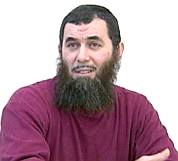 NEW YORK (AP) — A federal appeals court on Wednesday upheld the conviction of a Lebanese-born Swede who was sentenced to life in prison for plotting to open a terrorism training camp in Oregon to help al-Qaida.
NEW YORK (AP) — A federal appeals court on Wednesday upheld the conviction of a Lebanese-born Swede who was sentenced to life in prison for plotting to open a terrorism training camp in Oregon to help al-Qaida.
The 2nd U.S. Circuit Court of Appeals in Manhattan on Wednesday issued an order finding that Oussama Kassir had a fair trial when he was convicted in 2009 of supporting al-Qaida by trying to help open the camp in Bly, Ore., a tiny community of just a few hundred residents.
Prosecutors said Kassir, who's in his 40s, tried to set up the camp in late 1999 and early 2000 so al-Qaida could take advantage of relaxed U.S. gun laws and train European recruits for Islamic militancy. They said he "trained men to become terrorists on American soil," provided lessons on how to alter an  assault rifle so it could launch a grenade and told witnesses in Bly he supported Osama bin Laden.
assault rifle so it could launch a grenade and told witnesses in Bly he supported Osama bin Laden.
A cooperating witness, James Ujaama, who pleaded guilty in 2007 to providing material support to terrorists by loading programs onto Taliban computers during a trip to Afghanistan, testified he tried to create the training camp on 360 acres of land. He said the terrain, with small trees and rocks, and widely varying temperatures were similar to Afghanistan.
But the camp never really got off the ground. Ujaama said he visited the property only three times, the last time with Kassir, who traveled from London expecting to find lots of weapons and men eager to be trained.
Ujaama said Kassir became angry when he saw nothing had materialized.
At sentencing in September 2009, Kassir told a judge that witnesses had lied at his trial. He also said the jury couldn't have adequately studied the evidence because the deliberations lasted only two hours.
A three-judge panel of the appeals court rejected arguments that the trial judge erred by admitting evidence that was irrelevant and unfairly prejudicial and by letting a terrorism expert testify about the history of al-Qaida. The appeals court also rejected arguments that evidence was insufficient and the law used to convict was overly broad, was unconstitutionally vague and infringed on First Amendment rights.
Kassir's lawyer, Mark S. DeMarco, said Wednesday he hadn't read the appeals court's order and couldn't comment.
Portland and Seattle
Free Subscription to Breaking News
Free Subscription to Breaking News




















































































































































































































































































































































